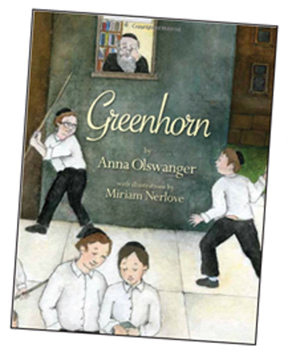 Greenhorn by Anna Olswanger is a middle-grade novel in which a young Holocaust survivor arrives in 1946 at a New York yeshiva, a religious Jewish school, where he will study and live. His only possession is a small box that he never lets out of his sight. Daniel, the young survivor, rarely talks, but the narrator, who stutters and who bears the taunts of the other boys, comes to consider Daniel his friend.
Greenhorn by Anna Olswanger is a middle-grade novel in which a young Holocaust survivor arrives in 1946 at a New York yeshiva, a religious Jewish school, where he will study and live. His only possession is a small box that he never lets out of his sight. Daniel, the young survivor, rarely talks, but the narrator, who stutters and who bears the taunts of the other boys, comes to consider Daniel his friend.Olswanger said she felt it was important to include stuttering in the book, which is released by New South Books.
“I heard the real story of Greenhorn thirty years ago in Israel,” she told the Stuttering Foundation. “The rabbi of my synagogue stood in the front of our tour bus as we approached Jerusalem and told us about a little boy who had lost his parents in the Holocaust. The boy wouldn’t speak when he came to live at the Brooklyn yeshiva where the rabbi himself was in the sixth grade, and wouldn’t let a tin box out of his sight.
“I knew as soon as the rabbi began talking that the story was important and that I wanted to write it; but I also knew I wanted to write the story I heard, not invent any backstory or previous history for the little boy. I was concerned about the ethics of writing fiction based on the Holocaust, and I wanted to honor what the little boy, called ‘Daniel’ in the book, went through in real life. I also wanted to honor what my rabbi, the basis of the ‘Aaron’ character in the book, went through. He stuttered at the time, was often made fun of, but was a compassionate friend to Daniel. I wanted all that to be in the book.”
The mystery of what’s in the box propels this short work, but the real power of Greenhorn lies in the small human drama it describes. The boy who stuttered and the boy whose family members died in a concentration camp are both ridiculed and excluded by the other kids. In the end, Aaron finds his voice and a friend in Daniel, and their bond offers hope for a future, one in which Daniel is able to let go of his box.
On another level, Greenhorn is a book about language and its social role. The boys in the yeshiva speak the colorful language of Brooklyn youngsters of the mid-1940s—Yiddish-inflected and peppered with slang. Aaron struggles to speak; he stutters in expressing himself. Daniel, the newcomer to the group, does not speak. Language helps bridge their very different worlds and experiences.
Vawter, author of Paperboy, had this to say, “Greenhorn manages to take a paper-thin slice of the horror of the event and wrap it into a heart-rending story that is told in a matter-of-fact voice. It’s rare in a children’s book for adults to feel on edge about ‘what’s in the box,’ but that's where I found myself. Steven Spielberg, in Schindler’s List, used the little girl in the red coat to help viewers focus on the human cost of the Holocaust. Anna Olswanger gives us a little tin box and a beautiful 48-page book to tell the story that should continue to be told through the ages.”
This book is available on Amazon.com. Visit www.olswanger.com for more information.
From the Summer 2013 Newsletter.






 Podcast
Podcast Sign Up
Sign Up Virtual Learning
Virtual Learning Online CEUs
Online CEUs Streaming Video Library
Streaming Video Library